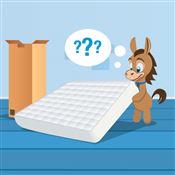How Long Do Memory Foam Mattresses Last
Memory foam mattresses offer body contouring and pressure-point relief for all types of sleepers. But they may cost more than other beds. So how long will your memory foam mattress last? Keep reading to find out.
 |
| © CreditDonkey |
Memory foam originally started as a shock-absorbent material in airplane seats. Developed by NASA, the popular substance is now used in NFL helmets, hospital beds and pillows, shoes, and, of course, mattresses.
Its ability to conform to your shape and then naturally spring back to its original shape makes it a popular choice. Side sleepers especially may benefit from its unique combination of support and comfort.
Read on to see what you can expect from your memory foam mattress.
Do Memory Foam Mattresses Wear Out?
In general, memory foam mattresses last about 10 years. This puts them in the same range as traditional innerspring beds. But like any mattress, a memory foam's longevity depends on the quality of its parts—and how you take care of it.
Start by choosing medium- to high-density memory foam to prevent premature wear and tear. The density refers to the foam's weight per square foot:
- Medium-density foams have 4 - 5.5 pounds per cubic foot
- High-density have more than 5.5 pounds per cubic foot
While high-density foam sounds ideal, it may be too stiff for some. Most people focus on medium density for natural comfort.
Memory foam mattresses are ideal for side sleepers because of their body contouring. A too-firm mattress that doesn't give under the weight of the shoulders and hips can knock a side sleeper's spine out of alignment. Memory foam also works for other positions. But some sleepers find the material too hot.
When Should You Replace a Memory Foam Mattress?
The general rule of thumb is to replace your memory foam mattress every 7–10 years. But the condition of your bed matters more than the age. Here are some signs that your memory foam bed may need replacing:
- Waking up feeling sore
- Having allergic reactions near the bed
- Being uncomfortable or sleeping restlessly
- A lack of "bounce back" in the memory foam when you get up
- Visible signs of mattress sagging
A full memory foam mattress isn't recommended for back sleepers. But a hybrid made of innerspring and foam can provide the support your back needs with added pressure-point cushioning. You might also consider an innerspring bed with a memory foam mattress topper.
Habits That Could Cause Premature Wear
While high-density memory foam can last up to 10 years, even the best bed will wear out prematurely with improper care.
To get maximum use out of your memory foam mattress, avoid the following:
- Excessive heat from electric blankets or heating pads
- Uneven foundations like a worn-out box spring
- Crumbs and liquid spills
While low-density memory foam mattresses tend to be more cost-effective, they wear out much faster. Premature sagging can misalign a sleeper's spine, causing sleeplessness and back pain. Stick with medium- to high-density foams with a solid core for the longest-lasting results and best value.
Do Memory Foam Mattresses Sag?
A weak core, or layer beneath the memory foam, can create a sagging mattress. Look for a bed with a strong core, such as the Leesa Memory Foam Mattress. It provides a support foam base that prevents sagging.
Your memory foam mattress also needs a steady foundation. You don't need a fancy box spring—just a flat, stable surface that will keep the mattress level. This allows even weight distribution and less wear and tear.
If you are concerned that your memory foam is sagging, put it on the floor and lie on it. If it doesn't sag in this position, the foundation is causing the problem.
Can You Flip a Memory Foam Mattress?
Unlike innerspring mattresses, you can't flip a memory foam bed. Most memory foam mattresses are made from the bottom up. That means the memory foam is the top layer. If you flip the mattress, you won't find yourself nearly as comfortable.
You can, however, rotate your memory foam mattress 180 degrees every few months. This helps even out the wear and tear in one area. It may prolong the life of your bed, especially if you sleep with a heavier partner.
For the average person, a 10-inch memory foam mattress provides the right amount of comfort without making you feel like you're drowning in foam. A 12-inch mattress may be good for heavier sleepers or couples that need a little more cushioning.
What Are the Advantages of Memory Foam?
Memory foam mattresses offer many benefits, including:
- Pressure-point relief
- Even weight distribution
- Good spinal alignment
- Little motion transfer
- Supports any sleep position
- Durability
What Are the Disadvantages of Memory Foam?
Here are some downsides to memory foam mattresses:
- Heat retention
- A specific odor from the foam
- Lack of support for some back and stomach sleepers
Bottom Line
Memory foam mattresses can last for at least 10 years with proper care. Choosing the level of right firmness, rotating it often, and cleaning it regularly should keep the foam in optimal condition.
Write to Kim P at feedback@creditdonkey.com. Follow us on Twitter and Facebook for our latest posts.
Not sure what mattress is right for you?
Answer a few short questions in our mattress quiz to receive tailored recommendations.
|
|
|









